The Top Shelf: Case Files 086-095: "A Lot More Than a Thousand Words"
By Mento 1 Comments
Welcome to The Top Shelf, a weekly feature wherein I sort through my extensive PS2 collection for the diamonds in the rough. My goal here is to narrow down a library of 185 games to a svelte 44: the number of spaces on my bookshelf set aside for my PS2 collection. That means a whole lot of vetting and a whole lot of science that needs to be done, ten games at a time. Be sure to check out the Case File Repository for more details and a full list of games/links!
Case File 086: Squaresoft's Final Fantasy X-2
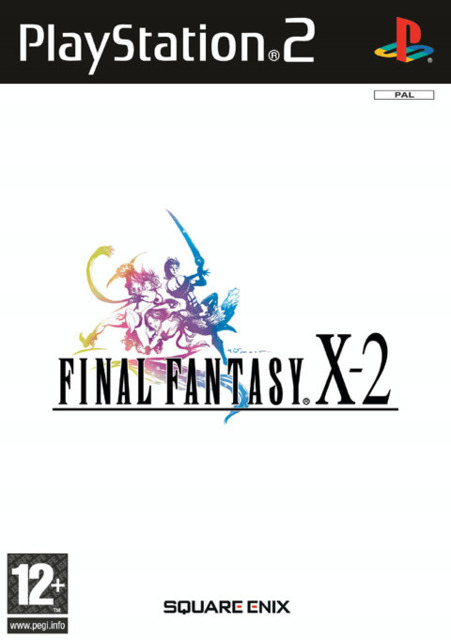
- Original Release (JP): 13/03/2003
- Not PS2 Exclusive (was remastered and bundled with its predecessor for PS3/Vita/Steam)
I'm going to be careful when broaching the subject of Final Fantasy X-2 because fellow mod @zombiepie is still in the opening chapters of Final Fantasy X, and I know he skims these blogs when compiling the weekly Community Spotlight and updating the GB community Twitter account (hey buddy). As a direct sequel, there's no getting around the two or three major occurrences in the finale of FFX that this sequel uses as a hook for a new adventure. Putting aside the series of events that lead up to whatever Yuna, Rikku and new character Paine are doing here, the game is significant to both Final Fantasy X's universe and for Squaresoft in general: it was the final game developed by Squaresoft before merging with long-time rivals Enix, and also has the dubious honor of being the first direct sequel to a Final Fantasy they've ever made. Each Final Fantasy is connected, tenuously, by a number of themes and commonalities such as crystals, spell names, the idea of a planet as a living entity and a whole bunch of yellow birds and fluffy bat things. That each one had been entirely independent up to this point was a testament to the depth of imagination and creativity that was poured into each new entry. It is a bummer that various financial woes precipitated the monetary necessity of a direct sequel to one of their more popular games. To Final Fantasy X-2's credit, whether you consider them net positives or not, it does at least change a number of core elements in lieu of too much in the way of new art assets or characters. Player progression is significantly different, switching from the labyrinthine Sphere Grid to a more streamlined cosplay-based Job system, and the combat now uses a semi-strategic real-time approach that requires the player think on their feet, more so than FFX which did away with the usual active time gauges for a set turn order determined by stats and each character's previous action. Ultimately, however, FFX-2 has this unfortunate Catch-22 problem where it's built primarily to appeal to FFX fans while alienating same with the amount of dramatic shifts to the tone, to the mechanics, and to certain characterizations. Were one to look past all the J-Pop numbers (which I secretly like, so sue me) and recycled content, I would argue that it's not a complete catastrophe.
Right now, I'm faced with a colossal struggle between Final Fantasy X and Final Fantasy XII to determine which is my favorite PS2-era Final Fantasy game. This silly little sequel clause I'm fixated on will force me to eventually choose one or the other, but not both. That means the third best PS2-era Final Fantasy game, this one, doesn't really stand a chance. There's no bronze medals to hand out here. Eliminated.
Case File 087: Cattle Call's Arc the Lad: Twilight of the Spirits
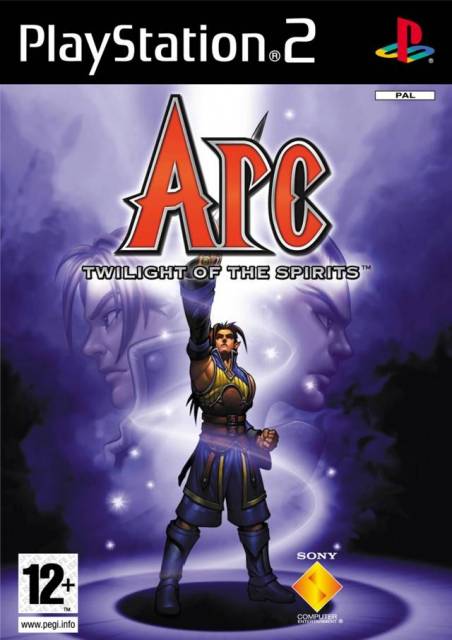
- Original Release (JP): 20/03/2003
- PS2 Exclusive!
There have been a number of times where my relative lack of PlayStation experience has played havoc with my perception with certain long-running Sony franchises. Skipping the original trilogy of Spyro back when they were developed by Ratchet & Clank's Insomniac Games, for instance, or having somehow mysteriously avoided Xenogears and Chrono Cross (no wait, I can explain that one: zero fucking European releases) has left me with a few significant gaps that completely recontextualizes playing the (usually lesser) sequels/reboots to those games years later. Arc the Lad, a trilogy of strategy RPGs for the PS1, is a series that had completely passed me by until I discovered Twilight of the Spirits, a 3D variant of the rare variety that does away with grids for a more spherical/radial approach that we'll later see in Phantom Brave. I enjoyed Twilight of the Spirits quite a bit, and not just because I was still in the market for SRPGs before I burned out spectacularly on them due to Nippon Ichi Software's prolific output. Twilight introduces two groups of protagonists that are, due to their very nature, nemeses of each other. The game ensures that it's not just a case of fantasy racism separating the party of humans and a party of demons and other non-human beings, with the various ways each party member of both squads becomes a dark mirror to the other. Neither party is depicted as wholly good or evil, however, and it becomes a game-long struggle to help the two groups find common ground. Naturally enough, it takes a far greater, unambiguous force of evil to do the trick. While the human team have their quirks, it's the party of monsters that are the true stars here, including a noble werewolf, a plant-like Poison Ivy-esque seductress whose true form is withered and crone-like, and the soulless creation of an eldritch deity of a long-forgotten religion with enough power to annihilate all existence who suddenly awakes after millennia in stasis with no clear purpose and decides to forgo the end of days to slake her own curiosity for a while (sort of like an anime version of Angel's Illyria). It many ways it gets lost in a giant ocean of wonderful PS2 JRPGs, but there's a smattering of memorable aspects.
Which, well, brings us to a conundrum. I don't necessarily want to fill this shelf with JRPGs, even though it's a favorite genre of mine that happens to be absurdly well represented for this console, but I don't feel right about kicking this one to the curb just yet. The dual party style, radial 3D movement, and other various stylistic touches are enough to raise it from the realm of banality, and so I think I'm going to add this one to a growing list of reserves: the "four star" tier games that I won't need to revisit in the second round, I shouldn't think, and might yet be passed over for something better. Considered.
Case File 088: SCE Cambridge Studio's Primal
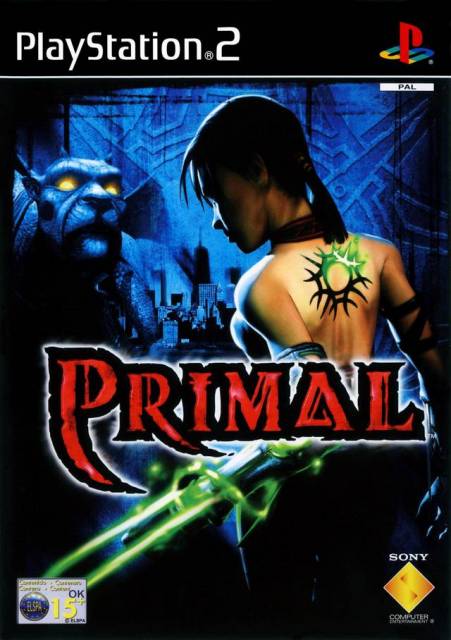
- Original Release (NA): 25/03/2003
- PS2 Exclusive!
Primal's a game like Haven: Call of the King where I feel like it was marketed quite a bit but failed to make much of an impact at launch. It could be that, as the product of a Sony first-party studio based in the UK, there might've been an unusually large promotional push in the local magazines and internet periodicals I was reading at the time. I don't think Primal's particularly bad, however, and in retrospect I can see what the developers were aiming for with its combination of combat, stealth and action-adventure style platforming as that unusual mishmash became increasingly more common. An assertive young woman is dragged into another world after witnessing the apparent murder of her beau by some demonic entity, teams up with a mopey looking gargoyle that claims to be a depowered guardian of the world they're in, and eventually learns to shapeshift into various forms each with their own unique abilities for traversal and combat. There's been a glut of games like this throughout the last two generations, games that generally attract outside talent such as filmmakers and authors, who craft these adventures that defy quick and easy genre descriptors (perhaps deliberately so) in order to adhere to an artistic outsider's own idea of a game. They're to be praised for breaking the mold, but that freeform nature also tends to damn them in turn as they end up being a sum of several undercooked parts. Another fine example of this is that Enslaved game that came out a while back, which incorporated about five different gameplay modes only semi-successfully. I admire Primal's boldness, but my lasting memories of actually playing the game aren't wholly positive.
I might have to lose this one. As distinct as it is, I can think of a few other games that follow the same sort of blueprint and manage it better - the upcoming Beyond Good & Evil, for one, and I'm sure there's a few others on the horizon as well. I won't throw Primal under a bus, but I can't see it ever making the shelf either. Eliminated.
Case File 089: Ubisoft Shanghai's Tom Clancy's Splinter Cell
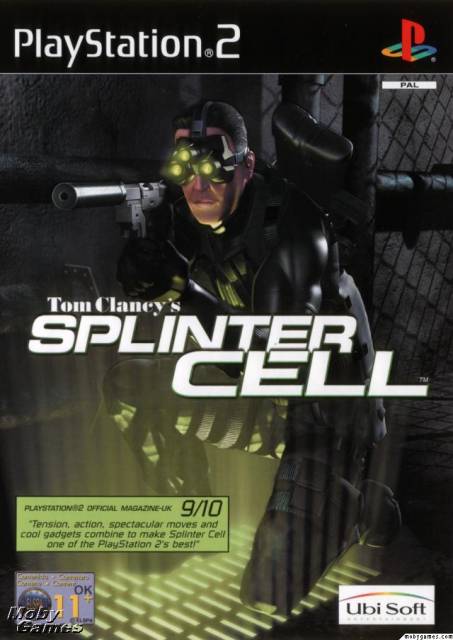
- Original Release (EU): 28/03/2003
- Not PS2 Exclusive (came out on damn near everything)
Well then. Not entirely surprised to find a copy of the first Splinter Cell while sorting through my PS2 games. I suppose at that time you were more or less issued it. Came in the mail with samples of "Tide", to paraphrase a great movie. I've never played it, hence the mild confusion in finding it here, but it's one of those well-known major milestones in the stealth action genre, in particular the ones that are a little more adamant that you can't be seen. I think I've mentioned before while talking about Hitman 2 that I had a general aversion to stealth games for the longest time, but have softened on them of late in part because I can appreciate a more deliberately-paced experience and also because I suspect the feedback noise/vision cone tech has improved considerably by now. (Ooh, that reminds me, I still have that copy of Dishonored 2 to break open. All in good time.)
I suppose I owe it to a franchise I've never experienced to start here, on its ground floor, and determine whether or not I was in the right to elude it for so long. It might be a very dated introduction but I'll no doubt see some reflection, no matter how pale, of a spark that ignited a multi-generational franchise. Considered.
Case File 090: GenePool Software's X2: Wolverine's Revenge
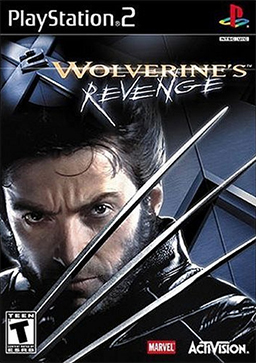
- Original Release (NA): 14/04/2003
- Not PS2 Exclusive (also out on Xbox, GameCube, PC and GBA)
A Wolverine game. This isn't the one where he flies at a helicopter in that one memorable Quick Look, I checked. It seems more like a licensed tie-in for the second movie, except it features Wolverine in an entirely new story. I guess an ensemble cast would've taken them too long? Time constraints are always the biggest concern (and usually the reason why they tend to suck) when trying to release a licensed game in time with a movie or TV show. Then again, maybe they were working on a Wolverine-focused game for a while and the movie proved to be a convenient marketing tool. I'm always curious about tie-in games that go in a completely new direction - did they just not know enough about the movie's plot to commit to a faithful recreation, or is it that the developer had a game idea for that license/brand in the works for a while and just needed the movie synergy to convince the publisher's money people to make it happen? (Also, how weird is it we got two "X 2" games this week?)
At any rate, I'm just rambling because I have no clue what this game is. It seemed to garner some fairly mediocre scores, so I might just save myself the trouble and let it slide. We are looking for the best of the best, here, and while I feel compelled to give every one of my unplayed PS2 games a shot, there's something to be said for being a little more discerning if I want this feature to be completed before the year's out. Eliminated.
Case File 091: Konami's Silent Hill 3
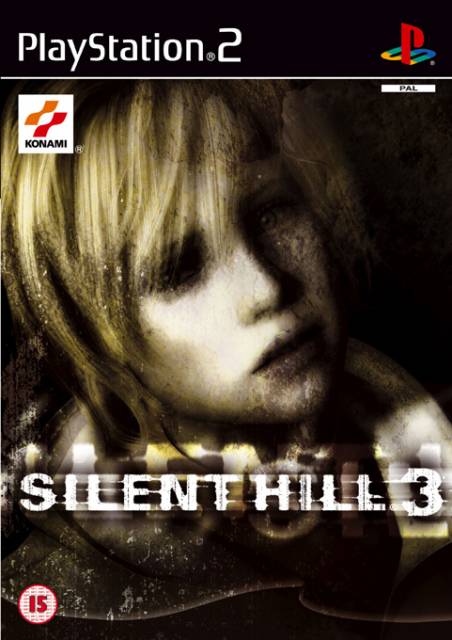
- Original Release (JP): 23/05/2003
- Not PS2 Exclusive (also out on PC, and got remastered for PS3/360)
I've mentioned that there's going to be a few big grudge matches to resolve in the second round. The most significant will be the two Final Fantasies (X and XII) and the two Silent Hills (2 and 3). While Silent Hill 2 is perhaps the most interesting of the two from a storytelling perspective, Silent Hill 3 is probably the more competent at being a Silent Hill game. In particular it cares the most about the series lore, as it continues the story of the first game many years later. Heather Mason is a great character also: a woman who runs the gamut of despair, righteous anger, teenage apathy and moments of painful vulnerability. She's one of the better realized heroines in interactive horror fiction, an ingénue with a mean streak, and knowing how your protagonist is feeling at any given moment is essential for a game like this, where tension and fear are so important to convey to the player by any audio-visual-narrative means necessary. Silent Hill 3 also spends less time wandering back and forth in the main town looking for clues, for better or worse I suppose, and it has some of the best scares of the entire series. I doubt I'll ever forget that room with the wall-length mirror, nor the conclusion to the haunted house ride at the theme park. There's also... I'm not sure why this is a thing for me, but horror games operate best when there's an illogic to them, a certain withholding mystique designed to unnerve you as you seek answers where there are none to be found. James Sunderland's trip to Silent Hill 2 becomes more comprehensible once you understand the level of psychology involved and how everything - from the enemies, to the locations, to the characters he meets - are meant to represent his own fractured psyche attempting to find resolution or atonement for his crippling feelings of guilt and shame. Silent Hill 3's mysteries are more pure in their unknowable nature, as various agents in the shadows - like the enigmatic Valtiel - mess around with and keep tabs on Heather because of what she might mean to the netherworld's status quo. Being watched intently might be more disturbing than being attacked, in the right context.
I won't resolve this today, but Silent Hill 2 and 3 will need to duke it out in the second round eventually. For now, it's moving through. Considered.
Case File 092: Capcom's Gregory Horror Show
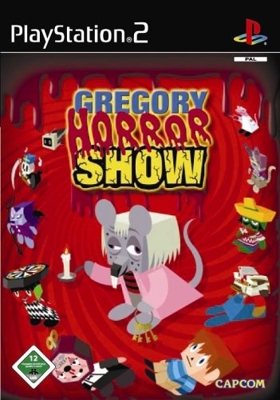
- Original Release (JP): 07/08/2003
- PS2 Exclusive!
I really like this game in abstract, and not just because it's one of the rare few that saw a European localization but not a US one. Based on an obscure Japanese manga and anime about a macabre hotel hosting a rogue's gallery of psychopathic weirdos and other misfits, all rendered in a distinctive cuboid art style, the player is unceremoniously dumped in the hotel by a shrewd (and Jamaican?) version of the Grim Reaper. The player may keep their soul, the deal goes, if they help Death infiltrate this odd hotel existing on the nexus between worlds and take the souls of the many guests there that have eluded his grasp for so long. The game works primarily on stealth and survival horror principles: most of the guests will attack you on sight, especially after you've taken their souls, but will otherwise operate on a predetermined schedule. Maybe that means prowling the corridors, spending time in their room, or visiting the TV lounge or gardens for some relaxation. At certain points, every hotel guest leaves their soul - which is carried around in a big glass container, for some reason - somewhere where it can be stolen by a nimble and silent hero. The goal, then, is to keep an eye on each target until an opportunity arises - the game helpfully tracks the daily schedule of each NPC once observed, in much the same way that Majora's Mask does. The difficulty of the game is that, once a guest has lost their soul, they'll still be around to cause you harm if they find you. Once you get far enough into the game, there'll be a dozen of these soulless creatures wandering the hallways and forcing you to escape and hide, making your reconnaissance that much more difficult.
It's a unique game and one that can be frustrating and compelling in equal measure, as you get introduced to each of its colorful characters in turn - sometimes getting closer than you'd perhaps prefer, as they perform painful "horror shows" once they catch you - and spend time unlocking the secrets of Gregory's hotel. Importantly, I like it enough that I won't have to struggle with the dilemma of letting a uniquely PS2 game stay or go because it doesn't play as well as I'd prefer. Considered.
Case File 093: cavia's Drakengard
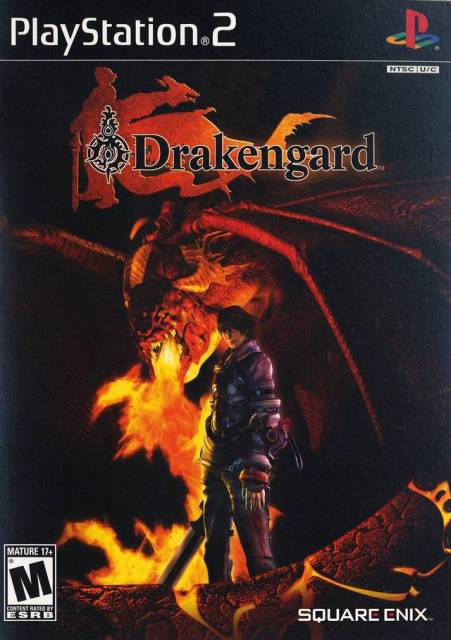
- Original Release (JP): 11/09/2005
- PS2 Exclusive!
It's surreal to think that this maligned and uncomfortably weird Musou clone from 2003 is a direct antecedent of a game that was released just last month to wide acclaim. Such is the strength of its storytelling, I suspect, which turns medieval swords and dragons pablum on its head with a surreal horror atmosphere, deeply psychologically flawed characters and a series of late-game twists that introduce creatures even more unsettling than anything the mind of Lovecraft could conjure. I'm getting ahead of myself, though. Drakengard pairs together Caim, a skilled knight who hates a lot of things but dragons most of all, and Angelus, a dragon who's not too keen to throw her lot in with a dracophobic psychopath. Circumstances call for it however, and the two unite to repel the forces of a dominating empire and rescue Caim's sister, Furiae, who turns out to be instrumental in a plan to bring the Watchers, a group of extradimensional deities, into our world so they can devour and destroy it utterly. The combat attempts to bridge Koei's Musou, which is to say gallons of enemies you cut through on a path to some mission critical area, and Bandai Namco's Ace Combat with its free-range (as opposed to the on-rails Panzer Dragoon) aerial combat atop a dragon. It's fine in theory but the gameplay is an unbalanced slog at the best of times and, if you know anything about Cavia, you know they hide all their best material behind a whole lot of grinding and farming. I would say, however, that the story is worth seeing by any means possible, short of perhaps actually playing the game. Not only are its procession of downer endings delightfully insane but it all ties into NieR, and by extension NieR: Automata, in some fascinating ways.
I could say Drakengard is an important video game touchstone for bringing Nier and Nier Automata into being. I could also argue that its utter uniqueness, both mechanically and narratively, affords it a certain intrinsic value of the sort that defines what this feature is all about. The exclusives and the aberrations - the games that define the PlayStation 2 best because there was nothing else like them on any other console, like Gregory Horror Show above. But, uh... I actually sort of hate Drakengard? So now this is happening: Eliminated.
Case File 094: Radical Entertainment's The Simpsons: Hit & Run
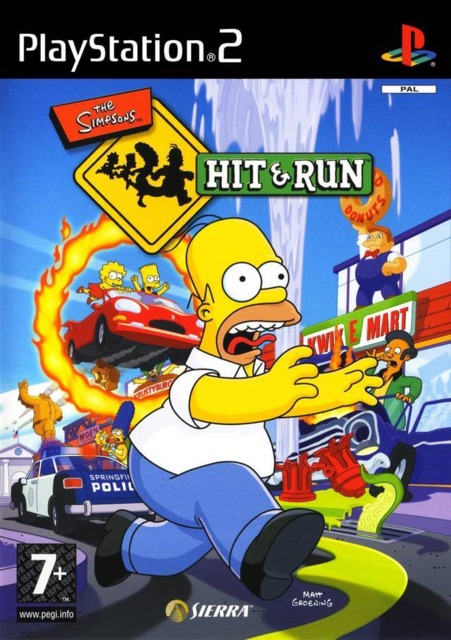
- Original Release (NA): 16/09/2003
- Not PS2 Exclusive (also out on Xbox, GameCube and PC)
The Simpsons have had a rough time of it with their video game adaptations. There are many licenses that are popular enough to convince people in this industry with a lot of money (who want even more money) to produce video game tie-ins, but when that license is a comedy show that puts laughs and absurd situations over anything that might more easily conform to a video game format it gets a little tricky to figure out how to use the medium to play to that license's strengths. What tends to happen is that the Simpsons clan and any number of Springfield citizens get awkwardly shoehorned into specific genres or formats, whether that's a Konami brawler, a platformer based on They Live, a skateboarding game, a bowling game, a wrestling game, a Crazy Taxi game (?), and then increasingly less likely situations like Bart's dreams and Bart's adventures in virtual reality. HIt & Run is definitely still in that vein, but choosing to imitate the action-driving open-world model established by Rockstar and their GTA games affords the developers an opportunity to exhibit a lot of the jokes, references and comedic situations that the show is known for. GTA has been trying to be funny for decades, since its inception almost, and to have an actually funny property step into that space works wonders for both that type of game and for a license that had yet to find its video game niche. While the gameplay is as workmanlike and generic as any other Simpsons transplant, it's a great vessel for the show's sense of humor and for showing off Springfield, the ever-changing Everytown USA that's custom built to accommodate any number of plotlines and caricatures. It wouldn't be until the tie-in movie game years later, where The Simpsons play fast and loose with video game conventions in a more knowing meta commentary on the medium, that this industry would find a more comfortable fit for America's favorite family.
I'm inclined to put The Simpsons: Hit & Run game ahead of all the other GTAs on the system when considering shelf placements, just to spite somebody, but I realise doing so without properly processing San Andreas (which is coming up) and before giving Vice City a long overdue whirl might actually be too vindictive, even for me and my highly subjective approach with this series. Once I've processed Vice City in the second round, I might have to consider a three-way battle royale to determine which is the best (and most entertaining) open-world racing/combat game for the PS2. Considered.
Case File 095: Naughty Dog's Jak II: Renegade
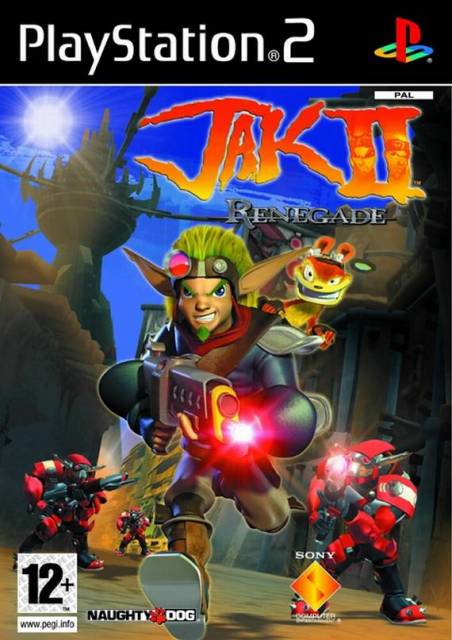
- Original Release (NA): 14/10/2003
- Not PS2 Exclusive (remastered for PS3 and Vita)
Talking of intellectual properties making an unusual switch to the GTA format, we have Jak II. Jak I, as we previously established, is a dyed-in-the-wool traditional 3D platformer of the kind that doesn't skimp on the collectibles. Conversely, Jak II doesn't so much do away with that aspect but expand and repurpose it to include a lot more hoverbikes and city exploration, following a set of missions that balance the various gameplay modes of platforming, third-person shooting and driving. It also dials up the 00s attitude a few notches, presenting a darker and grittier world of a distinctly dystopian bent and a protagonist who now talks, if only to growl about vengeance every few minutes. This series isn't leaping about for golden eggs on a picturesque archipelago any more, but a desperate fight for survival in an unfeeling futuristic city that's besieged by a ruthless, vaguely-insectoid mechanical alien race that are adept at imitating others and quick to ambush and murder the unprepared. It's as if someone thought the first Jak was fine, but it just needed to be a whole lot more like the 1995 movie Screamers.
I understood at the time what Naughty Dog were going for, veering their series into uncharted waters for the sake of being a bit more distinct and "mature" compared to what other mascot platformers were doing at the time, but that doesn't mean I necessarily approved. Much like Banjo-Kazooie: Nuts & Bolts, they were seeking to change an aging format that - in my view - was already perfectly fine. Unlike Nuts & Bolts, which spent its prologue spitefully claiming that the collect-a-thon platformer format of its forebears was dead forever and ever (yeah? How's that theory going?), Jak II felt like it wanted to expand the original game's boundaries than forsaking it entirely. On the whole, though, I didn't much care either for the increased focus on those awkward hoverbikes nor the new dark and brooding tone. Eliminated.
Results
Sort of a downer week, with no new Approveds for the shelf, but it's still a dectet with a bit of character to it. As we pass through the core of 2003 we're definitely starting to see more sequels, but there's also a steady flow of original properties too. The PlayStation 2 never rested on its laurels, which is a difficult act to pull off when you have one of the largest video game libraries of any console. I don't tend to think of the system as a shovelware horse in the same way that the Wii or the SNES or even the first PlayStation were, for as much as I admire and respect all three. It could be that there was just so much going on quality-wise month after month that the shovelware didn't even get a look in.
Before moving on, I have another "shout out" for a PS2 game I don't own but did play at one point. One of the last games to be developed by Unique Development - a Swedish licensed game factory that had been around since the Atari ST era - the licensed Futurama game was disappointing in some respects but not in others. Like The Simpsons, there's a certain amount of winging it involved when there's nothing about the show that directly translates to an identifiable video game experience. They settled on a system that, fittingly enough, the Family Guy PS2 game would later steal: the game has multiple protagonists, specifically the core trio of Fry, Leela and Bender, and makes each of their chapters play a little differently. Fry's were more third-person shooter, Leela's relied more on melee combat and Bender's focused on pure platforming. While the gameplay was fairly so-so, the game expertly tapped into the humor of the show, and its random dialogue clips and cutscenes between levels were easily the highlight. I believe the cutscenes were strung together and turned into a "lost episode" of the TV show on the DVD bonuses of one of the Futurama movies they put out between the show's cancellation and brief resurgence, so there might not be a reason to play the game any more, but I commend the developers for at least getting the most important part right.
Anyway, let's review today's numbers: we had an even split of Eliminateds and Considereds this week, putting our second round total to 34 games out of 95 for closer scrutiny. No change in the number of shelf occupiers, holding steady at eight approved games. Oh, and I'd also like to announce that at 95 out of our 185 games processed, we've finally passed the halfway point of the first round! Next week will see a number of titles from one Ubi-quitous developer in particular, and like another recent The Top Shelf will be entirely focused on western-developed games. It's still an odd enough collection, though, so hopefully I can get some good appraisals out of them. Be sure to stick around to find out which of the new games will pass (French) muster.
